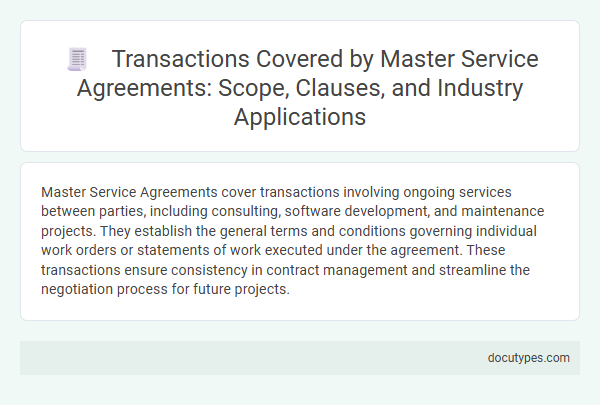Master Service Agreements cover transactions involving ongoing services between parties, including consulting, software development, and maintenance projects. They establish the general terms and conditions governing individual work orders or statements of work executed under the agreement. These transactions ensure consistency in contract management and streamline the negotiation process for future projects.
Introduction to Master Service Agreements (MSAs)
| Topic | Details |
|---|---|
| Introduction to Master Service Agreements (MSAs) | Master Service Agreements (MSAs) establish the foundational terms and conditions between parties for ongoing business relationships. MSAs outline roles, responsibilities, and general provisions, ensuring clarity and reducing the need for repetitive contract negotiations. |
| Scope of Covered Transactions | MSAs cover a wide range of transactions, including service deliveries, project work, consulting, and product supply. Each individual task or purchase order linked to the MSA benefits from pre-agreed terms, making contract management efficient and consistent. |
| Your Role and Benefits | You leverage MSAs to streamline agreements for multiple projects or services, minimizing risk and accelerating time-to-service. MSAs support flexibility by allowing new transactions under established terms without renegotiating each detail. |
Defining the Scope of Transactions under MSAs
Master Service Agreements (MSAs) establish a broad framework that governs multiple transactions between parties, specifying which types of services and deliverables fall under the agreement. Defining the scope of transactions under an MSA is crucial to avoid confusion and ensure clear expectations for all parties involved.
The scope clarifies which specific projects, work orders, or services are included, providing legal and operational boundaries. You can use this framework to streamline negotiations for individual transactions without drafting a new contract each time. Proper definition also helps manage risks by limiting liability to covered transactions.
- Services and Deliverables - The MSA explicitly lists the categories of services and deliverables covered under the agreement to ensure mutual understanding.
- Work Orders and Statements of Work - Transactions are often detailed through work orders or statements of work that fall within the MSA's defined scope.
- Exclusions and Limitations - The agreement defines any transactions or services that are excluded to avoid potential disputes.
Key Clauses in Master Service Agreements
Master Service Agreements (MSAs) define the scope of transactions covered between parties, establishing a clear framework for ongoing business relationships. Key clauses within MSAs ensure that the terms of service, payment, and responsibilities are well-delineated to avoid disputes.
- Scope of Work - Details the specific services or deliverables included under the agreement to avoid ambiguity.
- Payment Terms - Specifies how and when payments will be made, including invoicing schedules and penalties for late payments.
- Termination Clause - Outlines conditions under which either party can terminate the agreement and the consequences of termination.
Your understanding of these key clauses helps ensure that your transactions under the MSA are clearly governed and protected.
Types of Transactions Covered by MSAs
Master Service Agreements (MSAs) cover a wide range of transactions including service delivery, consulting engagements, and product supply. These agreements establish the general terms and conditions that govern future individual contracts, streamlining negotiations and reducing administrative tasks. Common transactions under MSAs include software development, maintenance services, and outsourcing arrangements.
Industry Applications of Master Service Agreements
Master Service Agreements (MSAs) typically cover a wide range of transactions including service deliveries, project management, and ongoing support within various industries. These agreements establish standardized terms to streamline processes and reduce negotiation time for recurring business activities.
In industries like IT, construction, and manufacturing, MSAs facilitate efficient management of complex service relationships by encompassing software development, equipment maintenance, and consulting services. They provide a framework that defines responsibilities, payment terms, and confidentiality clauses tailored to specific sector requirements. Your use of MSAs ensures clearer expectations and risk mitigation across multiple transactions, enhancing operational consistency.
Customization of MSAs for Different Sectors
Master Service Agreements (MSAs) cover a wide range of transactions tailored to the specific needs of various industries. Customization of MSAs ensures that sector-specific risks, regulations, and deliverables are properly addressed.
- Technology Sector - MSAs are customized to include intellectual property rights, software licensing, and data security provisions unique to IT services.
- Construction Industry - MSAs focus on project timelines, change orders, liability, and compliance with safety regulations, reflecting construction-specific requirements.
- Healthcare Sector - MSAs emphasize patient confidentiality, regulatory compliance with HIPAA, and service level agreements critical to healthcare operations.
Risk Management and Liability Clauses
What transactions are typically covered by Master Service Agreements in the context of risk management and liability clauses? Master Service Agreements (MSAs) generally encompass a wide range of transactions including services, deliverables, and project scopes, ensuring clear terms for risk allocation. These agreements explicitly define liability limits, indemnification, and dispute resolution mechanisms to protect your interests and manage potential risks effectively.
Payment Terms and Pricing Structures
Master Service Agreements (MSAs) typically cover a wide range of transactions, including the delivery of services, products, and related work. These agreements establish the foundational terms that govern all individual orders or projects executed under the MSA.
Payment terms defined in MSAs specify the timing, method, and conditions for invoicing and payment, ensuring clear financial expectations. Pricing structures may include fixed rates, time-and-materials, or milestone-based fees, tailored to align with the scope and complexity of Your transactions.
Dispute Resolution Mechanisms in MSAs
Master Service Agreements (MSAs) typically cover transactions involving the provision of services, deliverables, and project scopes agreed upon between parties. Dispute resolution mechanisms in MSAs define the procedures for resolving conflicts, including mediation, arbitration, or litigation to avoid prolonged legal battles. These clauses establish clear steps to manage disagreements efficiently, protecting both parties' interests and ensuring continuity of the contractual relationship.
What Transactions Are Covered by Master Service Agreements? Infographic

